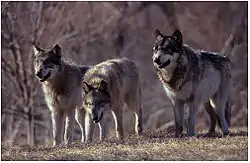
Wolves rely on their strength in numbers to protect each other as well as bring down prey.
In social psychology, a group can be defined as two or more humans who interact with one another, accept expectations and obligations as members of the group, and share a common identity. By this definition, society can be viewed as a large group, though most social groups are considerably smaller.
A true group exhibits some degree of social cohesion and is more than a simple collection or aggregate of individuals, such as people waiting at a bus stop. Characteristics shared by members of a group may include interests, values, ethnic or social background, and/or kinship ties. According to Hare, the defining characteristic of a group is social interaction.[1]
References
- ↑ Hare, A. P. (1962). Handbook of small group research. New York: Macmillan.
See also
- Group (sociology) (Wikipedia)
- Groups and leadership (Lecture)
Topics
This article is issued from Wikiversity. The text is licensed under Creative Commons - Attribution - Sharealike. Additional terms may apply for the media files.